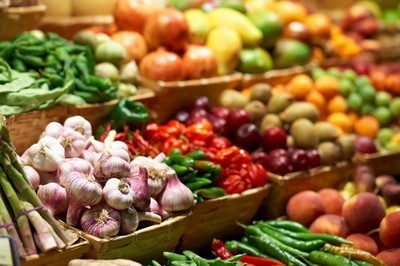Belarus increased its exchange trading volumes with Middle Eastern countries by 29%.

Photo is illustrative in nature. From open sources.
Adds
 PIONEER MEIZHENG BIO-TECH (5 in1) JC0871/ Rapid tests for the determination of the residual amount of β-lactams, tetracyclines, chloramphenicol, streptomycins, ceftiofur in milk, whey.
PIONEER MEIZHENG BIO-TECH (5 in1) JC0871/ Rapid tests for the determination of the residual amount of β-lactams, tetracyclines, chloramphenicol, streptomycins, ceftiofur in milk, whey. Rapid tests PIONER 5 in 1 for the determination of sulfonamides, tylosin, tilmicosin, lincomycin, erythromycin, fluoroquinolones
Rapid tests PIONER 5 in 1 for the determination of sulfonamides, tylosin, tilmicosin, lincomycin, erythromycin, fluoroquinolones
September 23, Minsk . Belarus increased its exchange trade volumes with Middle Eastern countries by 29%. This was reported to BELTA by the press service of the Belarusian Universal Commodity Exchange.
According to BUCE, over the first eight months of this year, Belarus's exchange trade turnover with Middle Eastern countries increased by 29% in value terms, reaching $56.4 million. This year, companies from seven countries in the region concluded transactions on the Belarusian exchange: Israel, Jordan, Iraq, Lebanon, the United Arab Emirates, Syria, and Turkey. By comparison, last year there were only four such countries.
"Residents of the UAE, Turkey, and Lebanon are particularly active in using the exchange mechanism. These countries account for more than half of the total exchange trade volume with the Middle East region. Moreover, the dynamics of transaction amounts are positive for almost all countries. For example, exchange turnover with the UAE from January to August increased by 45%, and with Turkey by 9%. Only with Lebanon has sales remained at the same level. However, given the demand for domestic lumber, we expect to achieve positive results in this market by the end of the year," the BUCE press service reported.
The most popular Belarusian goods among Middle Eastern traders are dairy products, feed additives, and wood products . In particular, milk powder is supplied through BUCE to Jordan, Lebanon, Syria, and the UAE, while lumber is in high demand in Israel, Iraq, and Turkey. Furthermore, flax fiber sales began in 2025. Currently, these products are regularly purchased on the exchange platform by Emirati and Turkish companies.
Regarding imports, in 2025, Turkish carded yarn producers regularly sold their products through BUCE, which resulted in a 15-fold increase compared to January-August 2024. In this case, buyers were Belarusian textile enterprises.
Currently, 210 business entities from 12 Middle Eastern countries are accredited at BUCE, which is 23 more than at the beginning of the year. The leaders in terms of the number of accredited companies are Turkey , the UAE, Israel, Egypt , and Syria.
The Belarusian Universal Commodity Exchange was established in 2004. The first trades took place in June 2005. BUCE is one of the largest commodity exchanges in Eastern Europe. Its main function is to assist Belarusian enterprises in exporting their products and to help foreign companies enter the Belarusian market. The exchange sells metal, timber, agricultural products , industrial and consumer goods of a wide range.
According to BUCE, over the first eight months of this year, Belarus's exchange trade turnover with Middle Eastern countries increased by 29% in value terms, reaching $56.4 million. This year, companies from seven countries in the region concluded transactions on the Belarusian exchange: Israel, Jordan, Iraq, Lebanon, the United Arab Emirates, Syria, and Turkey. By comparison, last year there were only four such countries.
"Residents of the UAE, Turkey, and Lebanon are particularly active in using the exchange mechanism. These countries account for more than half of the total exchange trade volume with the Middle East region. Moreover, the dynamics of transaction amounts are positive for almost all countries. For example, exchange turnover with the UAE from January to August increased by 45%, and with Turkey by 9%. Only with Lebanon has sales remained at the same level. However, given the demand for domestic lumber, we expect to achieve positive results in this market by the end of the year," the BUCE press service reported.
The most popular Belarusian goods among Middle Eastern traders are dairy products, feed additives, and wood products . In particular, milk powder is supplied through BUCE to Jordan, Lebanon, Syria, and the UAE, while lumber is in high demand in Israel, Iraq, and Turkey. Furthermore, flax fiber sales began in 2025. Currently, these products are regularly purchased on the exchange platform by Emirati and Turkish companies.
Regarding imports, in 2025, Turkish carded yarn producers regularly sold their products through BUCE, which resulted in a 15-fold increase compared to January-August 2024. In this case, buyers were Belarusian textile enterprises.
Currently, 210 business entities from 12 Middle Eastern countries are accredited at BUCE, which is 23 more than at the beginning of the year. The leaders in terms of the number of accredited companies are Turkey , the UAE, Israel, Egypt , and Syria.
The Belarusian Universal Commodity Exchange was established in 2004. The first trades took place in June 2005. BUCE is one of the largest commodity exchanges in Eastern Europe. Its main function is to assist Belarusian enterprises in exporting their products and to help foreign companies enter the Belarusian market. The exchange sells metal, timber, agricultural products , industrial and consumer goods of a wide range.


























































